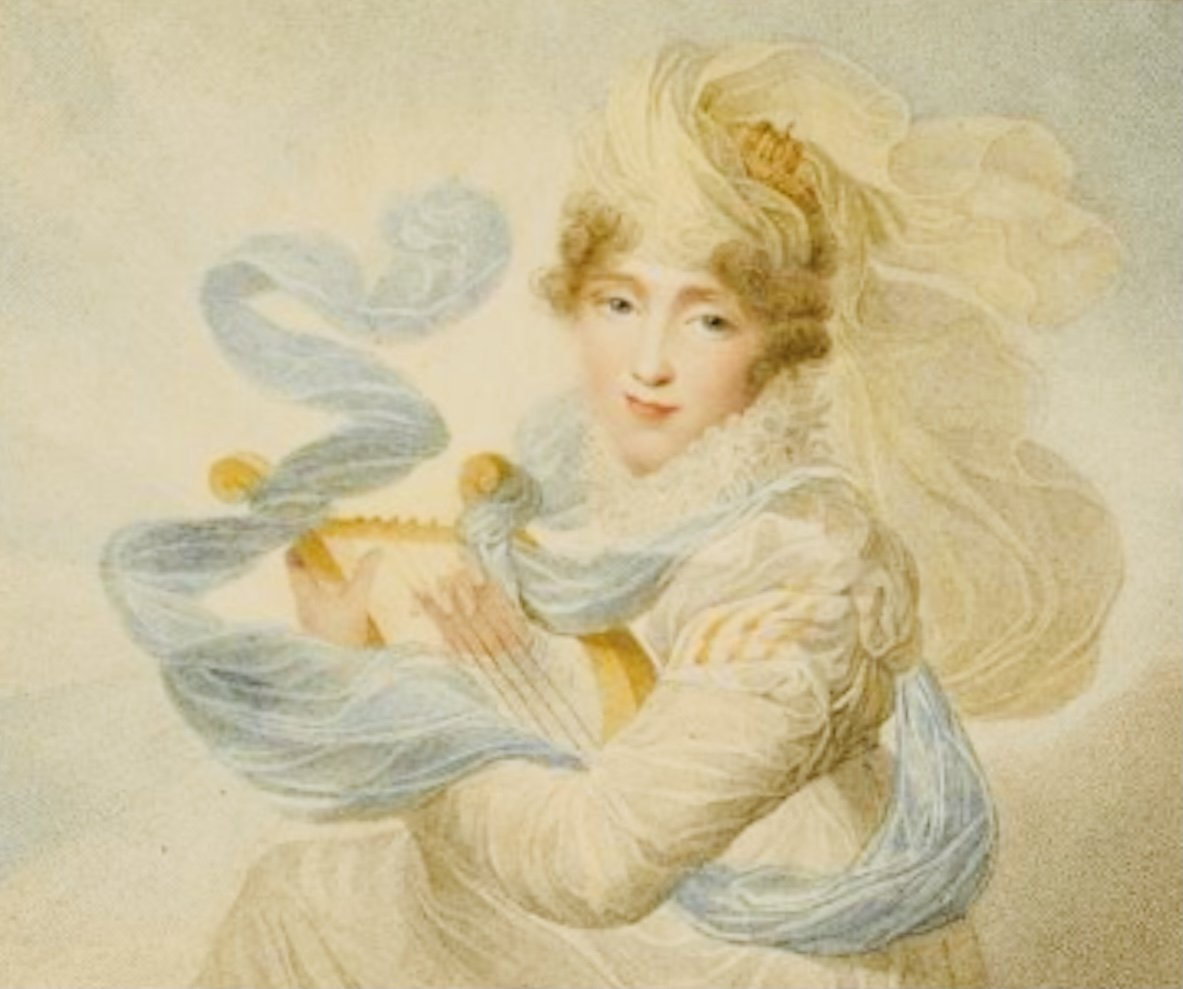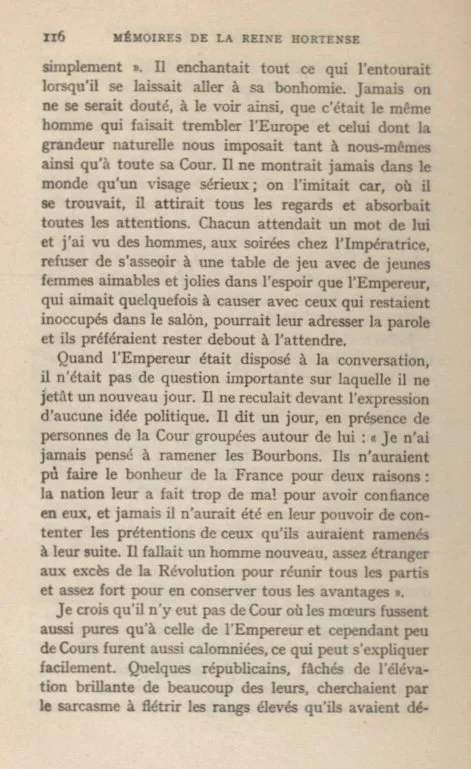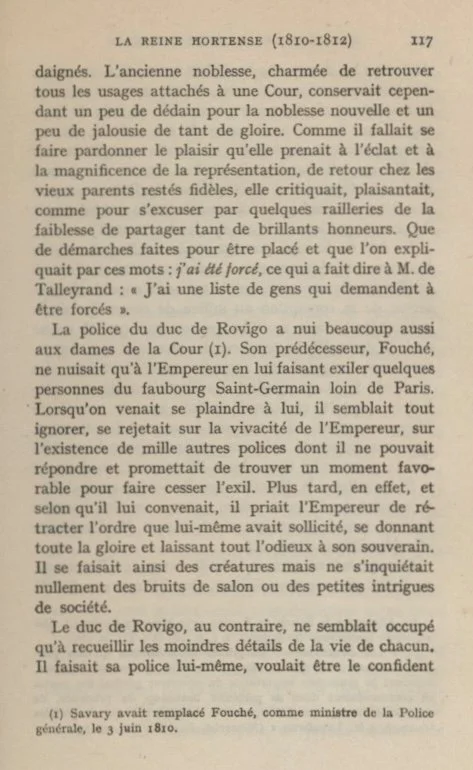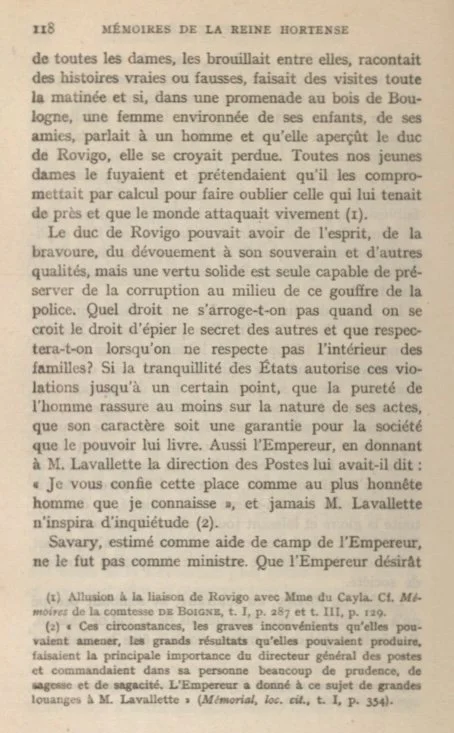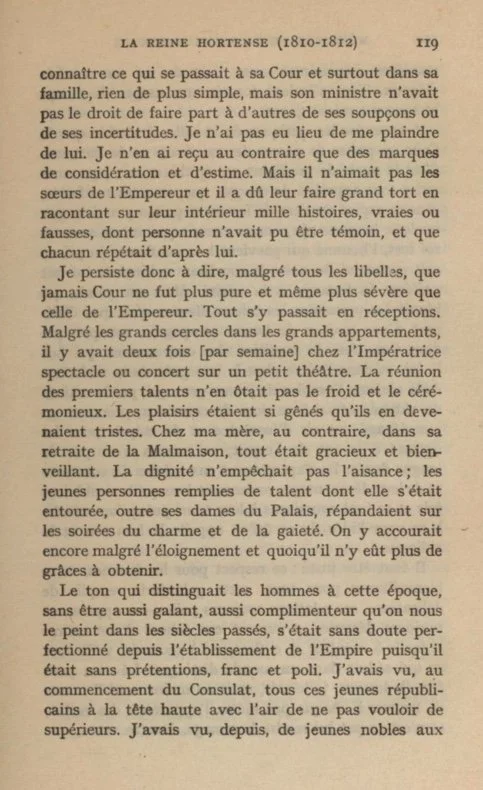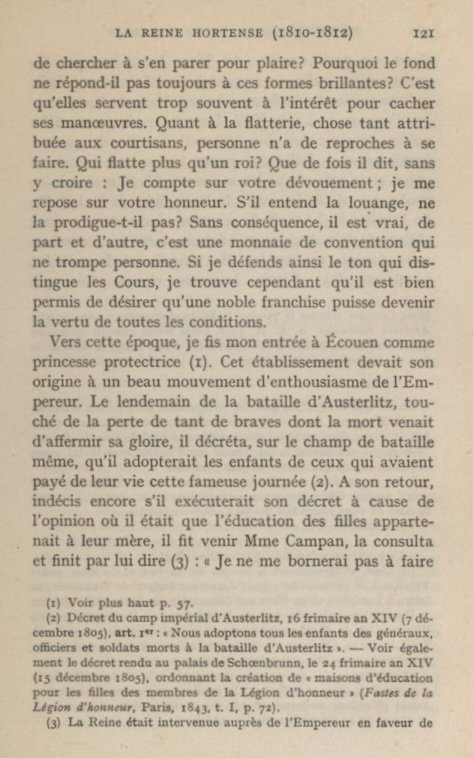Let’s have another look at Hortense’s Memoirs. If you want to read the book it is available for free at the side bar in English and French. Use the widget on the sidebar to translate the text below into pretty much any language.
Hortense complains about the Duc de Rovigo’s excessive spying into private lives and describes her opinions about French court and virtue.
Hortense’s memoirs continues:
I believe that there never was a court where morals were as pure as at that of the Emperor. Yet few courts have ever been as much condemned. This is easily explained. On the one hand there were a few republicans who, angry at the brilliant positions which some of their former associates had achieved, sought, sarcastically, to assail the circles to which they had not been promoted.
On the other were the former nobles, delighted at the revival of the traditional court etiquette, but at the same time remaining disdainful of the newer nobility and somewhat jealous of its laurels.
As courtiers of the old regime they were obliged to find excuses for the pleasure they took in the splendor of the new court. When they went back to see their old relatives who had remained faithful to the old regime they criticized and made fun of the present conditions, seeking, at the price of a few witticisms, to secure forgiveness for their weakness in aspiring to share the new honors.
How many efforts to secure a position people explained by saying, "It was forced upon me." As Monsieur de Talleyrand put it: "I have a list of people who want to be forced." The police system directed by the Duc de Rovigo also did a great deal of harm to the court ladies. His predecessor Fouché only harmed the Emperor when he obliged the latter to exile certain persons of the Faubourg Saint-Germain from Paris.
Whenever a complaint was made to Fouché he would pretend to know nothing about it, blaming it on the Emperor's impetuous temperament, on the fact that there were a hundred other branches of the police department which he could not superintend.
In the end he would promise to wait for a favorable moment and have the sentence of banishment lifted. Later, it is true, he would request the Emperor to rescind the order which he had himself asked for, thus giving himself all the credit and letting his master take all the blame. He thus made followers for himself, but he never bothered about drawing-room gossip or petty social intrigues.
The Duc de Rovigo, on the other hand, seemed to do nothing else than collect the slightest bits of information about everyone's private life. He acted as his own detective, wished to be the confidant of the ladies, stirred up quarrels between them, told stories which might or might not be true, spent all his morning making visits from one to another.
If, in the Bois de Boulogne, a woman surrounded by her children and her friends happened to be speaking to a man and caught sight of the Duc de Rovigo she felt her reputation was lost.
All our ladies did their best to avoid him. They declared he compromised them on purpose in order to make people forget about the person to whom he was attached and toward whom society was distinctly hostile.
The Duc de Rovigo may have been brave, witty, devoted to his master and had other qualities besides, but only the most firmly rooted virtue can withstand the contact with that mass of corruption, the police department.
What excuse has one to assume the right to pry into the secrets of others, and what can one respect if one does not respect the sanctity of family life? If it is necessary for the good of the state to carry on such investigations to a certain point, then the high morals of the man who does so should reassure the public as to the purity of his Intentions.
His character should offer society a guarantee for the power it bestows upon him. It was for these reasons that the Emperor when he appointed Monsieur de Lavallette director of the post office said to him, "I give you this post because you are the most honest man I know."
Nor did Monsieur de Lavallette ever cause the slightest uneasiness. Savary, although he was admired as the Emperor's aide-de-camp, did not meet with the same favor as cabinet minister.
It was natural enough that the Emperor should wish to know what was going on at his court and especially what the members of his family were doing, but the minister had no right to inform others regarding his suspicions or his discoveries.
I personally never had any reason to complain of him. On the contrary he only showed me consideration and esteem. But he did not like the Emperor's sisters and he did them a vast amount of harm by relating a thousand stories true or false, about their home-life, to which no one could witness, but which everyone afterwards repeated.
I persist in saying therefore that in spite of all the libels it was made the object of no court has ever been more moral or more strict than that of the Emperor. Many receptions were held. Besides the two formal gatherings in the state apartments there was twice a week either a play or a concert given by the Empress in her apartment on a little stage.
The fact that the most distinguished artists were present did not change the chilly and stilted atmosphere. The entertainment became so formal that it lost all gaiety. At my mother's house, on the contrary, in her exile at Malmaison, everything was gracious and pleasant.
Dignity did not prevent enjoyment. The young and talented ladies whom she had gathered about her in addition to her ladies in waiting made the evenings delightful.
People were glad to attend in spite of her living out of town and having no more favors to bestow. The manners of the gentlemen of that day, although not as gracious or as flattering as they are said to have been in earlier times, had unquestionably improved since the establishment of the Empire.
Men were simple, sincere and polite. In the early days of the Consulate I had seen young republicans holding their heads very high, apparently unwilling to admit that anyone could be their superior.
Since then I have seen young nobles who gave themselves disdainful airs, apparently unwilling to admit that anyone could be their equal. Both in time modified their attitude and improved by doing so.
According to the criticisms of those who are not received there no court can exist without flatterers and sycophants. It is the fashion to apply these terms to all those who belong to a court. I can imagine that under some feeble king everyone may seek to make himself the favorite and can do so by committing some base action.
I can also admit that under a powerful king the man who obtains the sovereign's favor may deserve the epithet of "courtier" in a derogatory sense, if the desire for advancement makes him prefer flattery to plain-speaking. But a palace where well brought-up people meet is not different from any private residence except that in the former there exist traditional rules of conduct which guide one's behavior, whereas in the tatter one follows the taste and inclination of the lady of the house.
How many young men there are who for fear of the ridicule associated with the term "courtling" adopt a distant tone, an insolent manner and an air of despising those about them. If they are clever this weakness does not last long. They themselves become aware that their attitude is not to their advantage, and they adopt those manners they once sought to avoid and become in their turn courtiers in all that that word implies in the way of courtesy and politeness.
One must be fair and admit that in society the things which are attractive are consideration for women, kindliness toward all, delicate thoughtfulness for others, polished manner of speech, correctness of dress, and especially those expressions of respect which can so easily be uttered and which are so agreeable to hear.
I know that corruption may be hidden away behind all this, but at least it is pleasant to meet at every step what appears to be virtue. Moreover, what better tribute can you pay to virtue than to seek to wear its colors in order to charm?
Why does not the inner self correspond to this brilliant exterior? Because the latter too often is a cloak beneath which the adventurer hides his maneuvers. As for flattery, that fault which is so often attributed to courtiers, no one need be ashamed of it.
What greater flatterer is there than a king? How many times he says without meaning it: "I depend on your devotion to my cause; I place my honor in your hands."
If he hears praise addressed to him, does he in turn not give it to others? To be sure this is of no importance in one case or the other. It is merely a conventional form of speech which deceives no one. If I appear to be defending here the manners one finds at court, I nevertheless think one should wish a noble sincerity to be admired in all ranks of society.
The original French is available below:



